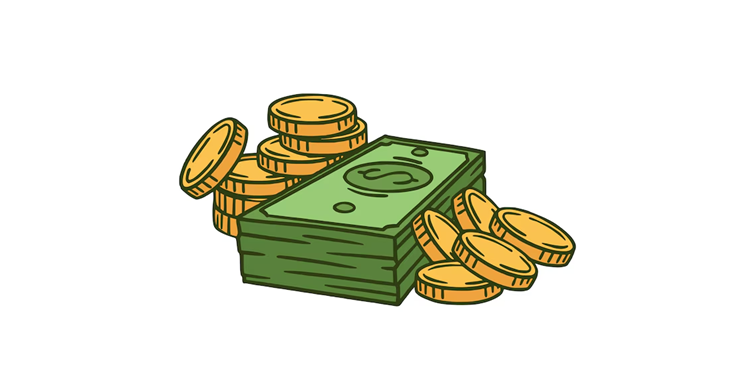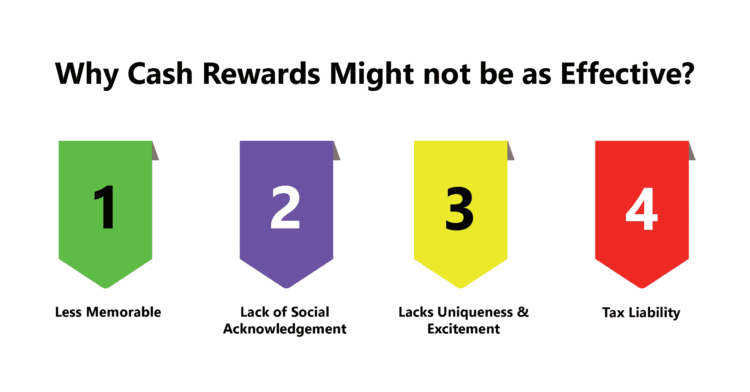1. Less Memorable: Employees may forget cash rewards quickly once spent, whereas non-monetary rewards, such as experiences or personalized gifts, create lasting, memorable impressions for employees.
2. Lack of Social Acknowledgment: Non-cash rewards, such as trips or special recognition events, are more socially shareable and appreciated, providing employees with the social recognition they desire.
3. Lacks Uniqueness: Cash rewards often feel impersonal and routine, whereas non-monetary rewards are perceived as more thoughtful and personalized, thereby increasing their impact on employee motivation.
4. Tax Liability: Cash rewards are subject to tax deductions, reducing their value, while many non-cash rewards may be exempt from tax, making them more appealing.
Traditionally, most organizations have followed the “Cash is King” principle regarding employee rewards, which is a ‘no-brainer.’ However, cash as an employee reward or ‘Cash Award’ is rapidly losing its appeal among many organizations. They are now seeking more meaningful and memorable rewards.
A research by McCartney and Holbeche in The Management Agenda states that 65% of managers consider non-financial recognition to be a key employee motivator.
A study by Cicero Group has also offered similar results, with 50% of employees believing that non-monetary rewards such as receiving praise from their managers can help in enhancing their trust in their superiors.

It is a common perception that cash rewards are just cash paid to employees as a token of appreciation for good work.
However, cash awards can take any other form equivalent to actual money without any loss of value. These may include deferred salary, stock options, or bonuses.

Organizations prefer cash as an employee reward as it is extremely simple to implement as compared to non-monetary rewards.
Most organizations feel that employees will value cash more as they can use it however they like.
However, employees do not perceive it similarly, rendering it less effective than other rewards.
Thus it is not surprising that around 84% of businesses today are investing in non-monetary employee rewards.
It serves as a wake-up call for organizations that have employed the traditional method of cash rewards. They need to realize that it is no longer very beneficial for employees.
Here’s why this once-popular form of reward has become ineffective in modern times:
1. Less Memorable
2. Lack of Social Acknowledgement
3. Lacks Uniqueness and Excitement
4. Tax Liability


When employees receive cash rewards, they are likely to forget about it as soon as they spend it. Cash rewards are unlikely to create lasting memories for the employee especially if the reward amount is not high.
On the contrary, a non-monetary recognition system, such as a personalized gift, a scuba-diving trip, a sponsored family vacation, coffee with the CEO, or even a handwritten ‘Thank You’ note, will likely create longer-lasting and more pleasant memories for employees.
The organization or the employees can click pictures or ‘selfies’ during the ceremony and share them on social media, which will make it even more memorable.
Whereas a cash reward might just stay hidden in the employee’s payslip; lost and forgotten by the employee soon.

One of the biggest drawbacks of cash rewards is that they do not provide the social recognition that employees desire.
Although the organization can share the award announcement on social media, it cannot replicate the impact of sharing the entire experience of a non-monetary reward, such as a Coffee with the CEO or a paid vacation, complete with pictures and videos.
Even a picture of the employee receiving a check from management will likely receive far fewer ‘likes’ and ‘comments’ on social media than photos of an employee enjoying a trip sponsored by the organization.
Since social recognition means a lot to employees today, cash rewards do not score as high on this point.

Cash awards might not sound unique or different from receiving an incentive or bonus. They do not make employees feel any different from their peers, who might have received such awards in the past.
This impersonal and undifferentiated nature of cash rewards makes it feel like a mere formality for employees. Good performers might be looking for something more meaningful.
Consequently, cash awards might not have the desired impact on employee motivation.
On the other hand, employees might perceive non-monetary awards as more valuable as they seem to be more ‘thought-through,’ ‘personalized,’ and ‘meaningful.’
Employees appreciate the organization’s efforts in arranging the reward, not just its monetary value.

As per taxation rules of the country, all cash rewards might be liable for tax deduction at source. This impacts the actual value of the reward received in hand.
On the other hand, non-cash monetary awards may be exempt from taxation up to a specific limit.
This exemption mitigates the tax burden on the actual value of the reward received by the employee.
Traditionally, regarded as a ‘no-brainer’ form of reward, cash rewards are falling out of favor of employees, reducing their impact on employee motivation.
It is time for organizations to abandon the tradition of cash rewards and consider adopting more diverse, non-monetary rewards that are likely more effective in driving employee motivation.

Lead author: Sagar Chaudhuri, the Co-Founder and CEO of HiFives. He is an HR Tech Evangelist with over 25 years of experience in both corporate and entrepreneurial settings. Previously, Sagar has held leadership roles with companies such as Genpact, Infosys, and ICICI Bank. He has an engineering degree from IIT Kharagpur and an MBA from IIM Lucknow. Connect on LinkedIn
To stay updated on the latest HiFives blogs, follow us on Twitter (@MyHiFives)